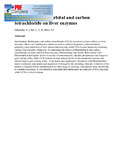| dc.description.abstract | Introduction: Barbiturates and carbon tetrachloride (CCL4) are known to have effects on liver enzymes. More ever, barbiturates which are used as sedative hypnotics, anticonvulsants, generally cause induction of liver microsomal enzymes while CCL4 cause hepatoxity releasing various liver enzymes.
Objective: To determine the effects of Phenobarbital and carbon tetrachloride on some selected liver enzymes.
Methodology and results: Rats treated with Phenobarbital had higher levels of activity of transaminases, alkaline phosphatase and longer to gain writing reflex while CCl4 treated rats had reduced levels of the mentioned enzyme and shorter time to gain writing reflex .
Conclusion and application: Treatment with Phenobarbital needs continuous adjustment and regulation of dosage by the attending clinician. A history of the patient is required before administration of other drugs or carrying a therapeutic drug monitoring to confirm toxicology. It was therefore concluded that barbiturates are inducers of liver enzymes while CCl4 is a liver toxicant | en |

